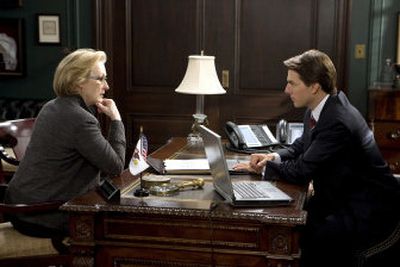Optimistically pessimistic

Robert Redford learned a lifelong lesson when he was a teenager.
“At 18, I went to the University of Colorado. I was asked to leave after a year,” says Redford, who lost a baseball scholarship after he began drinking heavily following his mother’s death.
“I went to Europe to study art. I was living a very Bohemian life with a lot of other students. They would talk about politics all the time. And I had nothing to say.
“That’s when I became determined to really read up about my country so I would have an answer for their questions.”
Redford returned to the United States after a few years abroad as a “pessimistic optimist.” He knew that while the country faced major problems, there was potential for change. It just meant getting involved.
That’s why he balanced his pursuit of an acting career with an interest in history, current events and politics.
Redford has fought for social causes such as the environment and American Indian rights. He founded the Sundance Institute and Film Festival, which helps small, independent filmmakers and has become a powerhouse in getting films noticed.
Many of his movies, such as “All the President’s Men,” “The Candidate” and “Three Days of the Condor,” were driven by strong political messages.
His newest, “Lions for Lambs,” which he directed and co-stars in with Tom Cruise and Meryl Streep, represents Redford’s passion for politics.
The film, opening today, looks at America’s current war efforts in Iraq and Afghanistan. But instead of focusing on the gun battles and big special effects, it’s about today’s politics and how they mirror the past.
Cruise plays a Republican senator pushing a military initiative in Afghanistan, Streep a cable news reporter who interviews him, and Redford a college professor who challenges a bright but party-minded student to become more aware.
“Lions for Lambs” reflects Redford’s belief that the American people are being failed by the educational system, politicians and media more interested in small matters such as a celebrity’s rehabilitation stay than in bigger, important matters such as the war.
While the film deals with the current conflict, Redford doesn’t want “Lions for Lambs” to be lumped in with other recent productions about the war, such as “Rendition,” “Kingdom” and the Spokane-filmed “Home of the Brave.”
“First of all, if it had just been about the Iraq war, I wouldn’t have been as interested in it as other projects I am developing,” Redford says.
“It is far more interesting for me to do a film that involves education, the media and politics and the military by having these individual stories.”
Redford pauses for a moment, sits back in his chair and rubs his hand across the face that made him a marquee giant for so many decades.
That face shows every detail of his 71 years of life. But his powder-blue eyes have as much sparkle as the first time filmgoers saw him on the big screen in the 1965 film “Inside Daisy Clover.”
“If you think about certain events in my lifetime – McCarthy, Watergate, Iran-Contra, this war – if you look underneath it, it is always the same sensibility that creates these conditions,” he says.
“Look at Nixon and his henchmen and what they did in Cambodia. Look at these guys and their henchmen; it is the same.”
He had some personal experience with President Nixon, who almost single-handedly stalled Redford’s interest in politics before it started.
In 1950, Nixon was running for the U.S. Senate in California, which he won that year, and was at a Boys’ Week event in Southern California. Redford, a Santa Monica native, was there to receive a sports award.
“He shook my hand,” Redford recalls, rubbing his hand across the sleeve of his blue shirt as if still trying to wipe away remnants of that meeting.
“I was 13 and couldn’t care less about politics. It was boring. I was into sports. But he (Nixon) was the creepiest, most artificial guy I had ever met. That stuck in my head.”
Redford is certain he’ll be hammered by some people in politics and the media over “Lions for Lambs.” He has heard that a conversation on Fox News Channel led to the question, “What’s the problem with Redford?”
“My problem is that I love this country,” he says. “I wanted to make this film because I am in mourning for my country.
“The film is about frustration. It’s about sadness. It is about what we have lost that we didn’t have to lose because we let this happen.
“I accept the fact that there will be some controversy. The sad thing is that some of the controversy will be biased because our country is so polarized right now, it is horrible.”
Despite the frustration that travels through Redford’s voice in waves, there is still a part of him that remains optimistic.
“If people with broader education went into politics, we wouldn’t have these kind of characters,” he says. “If young people were more educated about our political system, they would demand certain things they are not demanding now.
“So, where is the seed that will change this? I think it is education.”